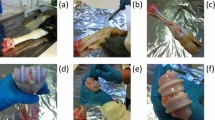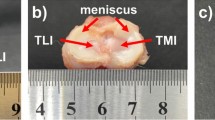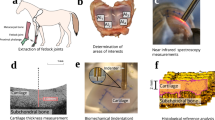Abstract
IN 1962, McCutcheon1 first drew attention to a decrease in the permeability of articular cartilage with increasing depth from the surface. This observation has been confirmed2 and the permeability shown to be inversely related to the fixed charge density of the cartilage matrix. In turn the fixed charge density can be shown to be a direct measure of the mucopolysaccharide content of the matrix (unpublished results of A. Maroudas and H. Muir).
This is a preview of subscription content, access via your institution
Access options
Subscribe to this journal
Receive 51 print issues and online access
$199.00 per year
only $3.90 per issue
Buy this article
- Purchase on Springer Link
- Instant access to full article PDF
Prices may be subject to local taxes which are calculated during checkout
Similar content being viewed by others
References
McCutcheon, C. W., Wear, 5, 1 (1962).
Maroudas, A., Biophys. J., 8 (5), 575 (1968).
Author information
Authors and Affiliations
Rights and permissions
About this article
Cite this article
MAROUDAS, A., BULLOUGH, P. Permeability of Articular Cartilage. Nature 219, 1260–1261 (1968). https://doi.org/10.1038/2191260a0
Received:
Issue Date:
DOI: https://doi.org/10.1038/2191260a0
This article is cited by
-
The Protective Function of Directed Asymmetry in the Pericellular Matrix Enveloping Chondrocytes
Annals of Biomedical Engineering (2022)
-
Customized Multilayered Tissue-on-a-Chip (MToC) to Simulate Bacillus Calmette–Guérin (BCG) Immunotherapy for Bladder Cancer Treatment
BioChip Journal (2022)
-
Chondrocyte Deformations Under Mild Dynamic Loading Conditions
Annals of Biomedical Engineering (2021)
-
Effect of structural distortions on articular cartilage permeability under large deformations
Biomechanics and Modeling in Mechanobiology (2020)
-
Molecular transport in articular cartilage — what have we learned from the past 50 years?
Nature Reviews Rheumatology (2018)
Comments
By submitting a comment you agree to abide by our Terms and Community Guidelines. If you find something abusive or that does not comply with our terms or guidelines please flag it as inappropriate.



